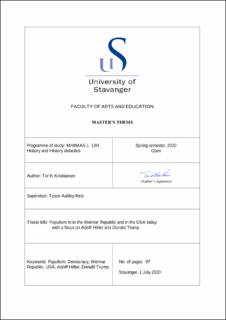| dc.contributor.advisor | Retz, Tyson Ashley | |
| dc.contributor.author | Kristiansen, Tor K | |
| dc.date.accessioned | 2020-08-05T11:30:37Z | |
| dc.date.available | 2020-08-05T11:30:37Z | |
| dc.date.issued | 2020-05 | |
| dc.identifier.uri | https://hdl.handle.net/11250/2670947 | |
| dc.description | Master's thesis in History didactics | en_US |
| dc.description.abstract | The main objective of this thesis is to investigate if Adolf Hitler used a populist style in his campaign for power during in the Weimar Republic. A contemporary understanding of populism has been used in this investigation. The thesis provides a review of recent scholarly literature on populism which is used as a reference in the investigation of Hitler and his agitation for the Nazi party. The basis for the investigation of Hitler is his book Mein Kampf and excerpts from some of his speeches. Excerpts from the leftist weekly magazine Die Weltbühne that was issued during the Weimar period has been used to provide some insight into how Hitler and the Nazis were viewed at the time. Some historical background for the events during the Weimar Republic is provided. The conclusion of this main objective of the thesis is that Hitler used a populist style to gain power in 1933.
The secondary objective of the thesis is to provide a description of how populism has been expressed in the USA during the first three years of Donald Trump’s presidency. The scholarly literature on populism is used to explain some background for Trump’s populist behaviour. Opinions from the liberal press, mainly The New York Times and The Washington Post and also from recent books on Trump’s presidency are used to illustrate the situation.
Populism thrives in the tension which exists in a democracy between popular sovereignty and liberal democracy with its emphasis on human rights, individual liberties, a political discourse based upon expertise and facts and the rule of law. A third objective of the thesis is to provide some comments on how populist leadership has challenged liberal democracy, as exemplified by the presidency of Donald Trump and Adolf Hitler’s assumption of power as Reichskanzler in the Weimar Republic. | en_US |
| dc.language.iso | eng | en_US |
| dc.publisher | University of Stavanger, Norway | en_US |
| dc.relation.ispartofseries | Masteroppgave/UIS-HF-IKS/2020; | |
| dc.rights | Attribution-NonCommercial-NoDerivatives 4.0 Internasjonal | * |
| dc.rights.uri | http://creativecommons.org/licenses/by-nc-nd/4.0/deed.no | * |
| dc.subject | Weimar Republic | en_US |
| dc.subject | USA | en_US |
| dc.subject | Adolf Hitler | en_US |
| dc.subject | Donald Trump | en_US |
| dc.subject | populism | en_US |
| dc.subject | democracy | en_US |
| dc.subject | historiedidaktikk | en_US |
| dc.subject | demokrati | en_US |
| dc.title | Populism in in the Weimar Republic and in the USA today with a focus on Adolf Hitler and Donald Trump | en_US |
| dc.type | Master thesis | en_US |
| dc.description.version | updatedVersion | en_US |
| dc.subject.nsi | VDP::Samfunnsvitenskap: 200::Pedagogiske fag: 280::Fagdidaktikk: 283 | en_US |
| dc.subject.nsi | VDP::Humaniora: 000::Historie: 070 | en_US |
| dc.source.pagenumber | 97 | en_US |

